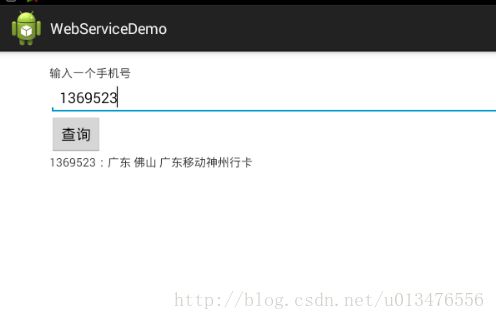Android---56---Android应用调用Web Service/号码归属地查询
使用Android应用调用Web Service
需要工具:
ksoap2-android
下载地址:http://pan.baidu.com/s/1jGL6b10
build path将ksoap2-android 添加到项目工程中
先将ksoap2-android 包导入 libs目录下,右键build path -> add to build path
点击项目工程名,右键 build path -> configure build path 在ksoap2-android这个包前面打上对号,点击OK
完成
使用Android应用调用Web Service 步骤:
1.创建HttpTransportSE对象,该对象用于调用Web Service操作
通过构造方法可以指定WebService的WSDL文档的URL
HttpTransportSE transportSE = new HttpTransportSE(ServiceURL);
2.创建SoapSerializationEnvelope对象,生成调用Web Service方法的SOAP请求信息
SoapSerializationEnvelope envelope = new SoapSerializationEnvelope(SoapEnvelope.VER10);
3.创建SoapObject对象,该对象创建时需要传入所要调用的Web Service的命名空间、Web Service方法名
SoapObject rpc = new SoapObject(namespace, methodName);
4.如果有参数需要传递给Web Service服务器端,需要调用SoapObject对象的addProperty(String name ,Object value)方法来设置参数
rpc.addProperty("mobileCode", phoneNum);
rpc.addProperty("userId", "");
5.调用SoapSerializationEnvelope的setOutputSoapObject()方法,或者直接对bodyOut属性赋值,将前两步创建的
SoapObject对象设为SoapSerializationEnvelope的传出SOAP消息体
envelope.bodyOut = rpc; envelope.setOutputSoapObject(rpc);
6.调用对象的call方法,并以SoapSerializationEnvelope作为参数调用远程Web Service
transportSE.call(soapAction, envelope);
7.调用完成后,访问SoapSerializationEnvelope对象的bodyIn属性,该属性返回一个SoapObject对象,该对象就代表了Web Service的返回消息
解析该SoapObject对象,即可获取调用web Service 的返回值
SoapObject object = (SoapObject) envelope.bodyIn;
号码归属地查询:
布局文件:
<LinearLayout xmlns:android="http://schemas.android.com/apk/res/android"
xmlns:tools="http://schemas.android.com/tools"
android:layout_width="fill_parent"
android:layout_height="fill_parent"
android:orientation="vertical"
android:paddingBottom="@dimen/activity_vertical_margin"
android:paddingLeft="@dimen/activity_horizontal_margin"
android:paddingRight="@dimen/activity_horizontal_margin"
android:paddingTop="@dimen/activity_vertical_margin" >
<TextView
android:layout_width="wrap_content"
android:layout_height="wrap_content"
android:text="输入一个手机号" />
<EditText
android:id="@+id/phone_num"
android:layout_width="fill_parent"
android:layout_height="wrap_content"
android:inputType="textPhonetic"
android:singleLine="true" />
<Button
android:id="@+id/query"
android:layout_width="wrap_content"
android:layout_height="wrap_content"
android:text="查询" />
<TextView
android:id="@+id/show"
android:layout_width="fill_parent"
android:layout_height="fill_parent" />
</LinearLayout>
Activity:
public class MainActivity extends Activity {
private EditText PhoneNum;
private Button query;
private TextView show;
private String result;
@Override
protected void onCreate(Bundle savedInstanceState) {
super.onCreate(savedInstanceState);
setContentView(R.layout.activity_main);
PhoneNum = (EditText) findViewById(R.id.phone_num);
query = (Button) findViewById(R.id.query);
show = (TextView) findViewById(R.id.show);
final Handler handler = new Handler() {
@Override
public void handleMessage(Message msg) {
if (msg.what == 0x123) {
show.setText(result);
}
}
};
query.setOnClickListener(new OnClickListener() {
@Override
public void onClick(View v) {
final String phoneNum = PhoneNum.getText().toString().trim();
new Thread() {
public void run() {
// 命名空间
String namespace = "http://WebXml.com.cn/";
// 方法名称
String methodName = "getMobileCodeInfo";
// ServiceURL
String ServiceURL = "http://webservice.webxml.com.cn/WebServices/MobileCodeWS.asmx";
// soap Action
String soapAction = "http://WebXml.com.cn/getMobileCodeInfo";
// 指定WebService 的命名空间和调用方法
SoapObject rpc = new SoapObject(namespace, methodName);
// 需要传入参数
rpc.addProperty("mobileCode", phoneNum);
rpc.addProperty("userId", "");
// 生成调用WebService方法的SOAP请求信息,并指定SOAP的版本
SoapSerializationEnvelope envelope = new SoapSerializationEnvelope(
SoapEnvelope.VER10);
// envelope.bodyOut = rpc;
// 设置是否调用的是dotNet开发的WebService
envelope.dotNet = true;
envelope.setOutputSoapObject(rpc);
HttpTransportSE transportSE = new HttpTransportSE(
ServiceURL);
try {
transportSE.call(soapAction, envelope);
} catch (Exception e) {
// TODO Auto-generated catch block
e.printStackTrace();
}
SoapObject object = (SoapObject) envelope.bodyIn;
// 这个方法得到的是一个键值对,
// result = object.toString();
result = object.getProperty(0).toString();
handler.sendEmptyMessage(0x123);
};
}.start();
}
});
}
}
